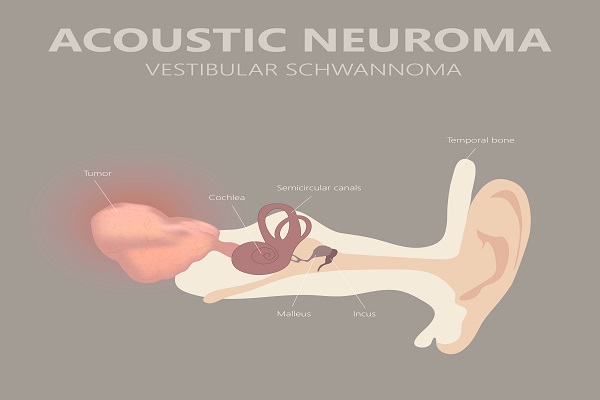How Serious Is an Acoustic Neuroma

As it is, acoustic neuroma should not be fatal. This non-cancerous and slow-growing tumor develops in the vestibular nerve from the inner ear to the brain. It usually develops from the Schwann cells that cover the main nerve and grows slowly or sometimes, not at all. However, on the rare occasion that the tumor grows and becomes large enough to press against the brain, it will interfere with a person’s vital functions.
The growth of the acoustic neuroma
Acoustic neuroma grows at an average of 1.5 millimeters per year. Many studies also suggest that these tumors can show little or no growth at all for 10 years. When the acoustic neuroma does not grow, there is no reason for the patient to panic and have it removed. Doctors would suggest monitoring the growth of the tumor.
On rare occasions, an acoustic neuroma can grow rapidly. Often, this growth is without reason. There are no dietary or environmental factors found to affect the growth of an acoustic neuroma. When the tumor does grow, the doctors will suggest invasive or non-invasive procedures or therapies.
The only reason for the growth of an acoustic neuroma is the failure of the “governor” gene to suppress the growth of the Schwann cells. These cells coat the fibers with insulation that slow down the growth of the tumor. If the gene fails, the cells will most likely increase. Sometimes, this can trigger the neuroma to double in size within six months to a year.
What happens when the acoustic neuroma grows?
Most acoustic neuromas are not dangerous or fatal because, as non-cancerous cells, they do not invade and destroy tissues. However, the cells can still cause discomfort and some conditions on the patients if they go through a period of rapid growth. The acoustic neuroma can push against the surrounding structures and affect the movement of the facial muscles. If the tumor gets larger, it can also affect swallowing, eye movement, and speaking.
Early and advanced symptoms of acoustic neuroma
But even with smaller tumors, an acoustic neuroma can still cause hearing loss and balance function problems. In fact, impaired hearing is one of the early symptoms of acoustic neuroma. People usually confuse this symptom with other disorders, not knowing that it could be a cause of acoustic neuroma. Other early symptoms are as follows:
- Ringing or buzzing in the ear
- Difficulties with balance
- Facial numbness
- A feeling of fullness in the affected ear
While other disorders can also cause these early symptoms, patients should consult doctors when they experience one or more of these symptoms. Patients should not wait for more advanced symptoms to start to appear. Among the many advanced symptoms of acoustic neuroma are headache, facial twitches, and double vision. Difficulty in swallowing and pain in the face are also considered advanced symptoms.
Consult with a doctor
Despite being benign, you should not neglect the symptoms of acoustic neuroma. It can still be fatal when left untreated because, although rare, the possibility of it growing is still there. Doctors will suggest regular tests to observe the growth of the tumor. This way, you can choose to remove it surgically or via radiation therapy once it starts to grow.
Get more information here: https://arizonaneurosurgeon.com or call Randall Porter, M.D. at (602) 603-8951
Check out what others are saying about our services on Yelp: Acoustic Neuroma in Phoenix, AZ.
Recent Posts
Spondylolisthesis occurs when one vertebra in the spine slips forward over the one below it, and understanding treatment helps patients make informed decisions about pain relief and mobility. This condition can cause mild to severe lower back pain, leg pain, stiffness, or even changes in posture and walking patterns. Understanding the full range of treatment…
Hemifacial spasm is a neurological condition that causes involuntary twitching or contractions on one side of the face. These spasms may begin near the eye and gradually affect surrounding muscles, including the cheek and mouth. While the condition is not typically life-threatening, it can significantly impact daily life and emotional well-being. Hemifacial spasm treatment focuses…
A herniated lumbar disc occurs when the soft center of a spinal disc pushes through a tear in the outer ring, often irritating nearby nerves. Early attention helps reduce pain and protect nerve function. Patients may experience sharp low back pain, radiating leg pain (sciatica), numbness, or weakness. A neurosurgeon evaluates symptoms, reviews imaging studies,…
Meningioma is a type of tumor that develops from the membranes covering the brain and spinal cord. While many meningiomas grow slowly and may not cause noticeable symptoms, some tumors can lead to significant health concerns. When you can recognize the signs early, you can get the treatment you need from a neurosurgeon, giving you…


